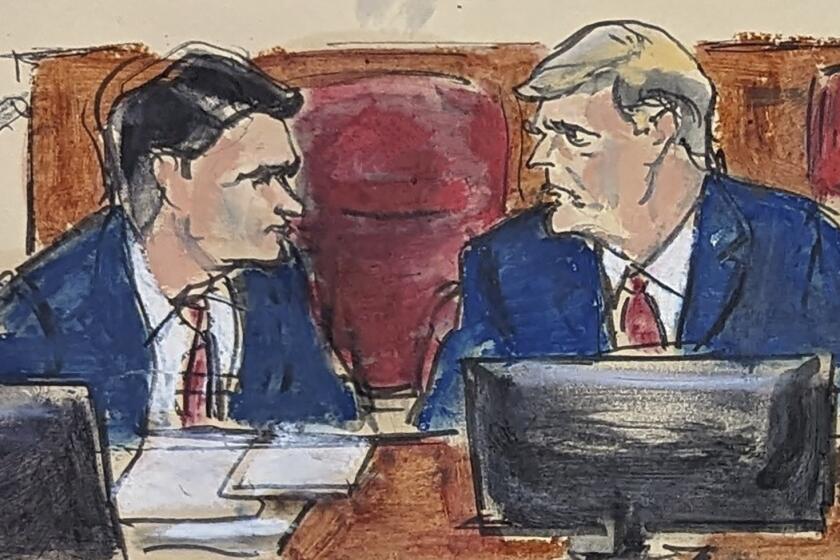Early-voting totals reach record highs
For vast swaths of Americans, election day has already come and gone thanks to a record level of early voting -- a big transformation of the way Americans exercise their most fundamental right as citizens. In three swing states -- North Carolina, New Mexico and Colorado -- the number of voters who have already cast their ballots has reached more than 70% of the number who voted there in 2004.
That may represent the beginning of a tidal wave of voting participation that could match or break a record set a century ago, when two-thirds of eligible voters went to the polls for the 1908 presidential election.
The influx in many places seems to be favoring Obama, as Democratic early voters outnumber Republicans in all but one state that keeps track of party affiliation, according to data compiled by the U.S. Elections Project at George Mason University.
Michael P. McDonald, director of the project, predicts that about 30% of all ballots this year will be cast before election day. That would be up from 20% in 2004 and 7% in 1992.
“These early numbers are startling, far outpacing what would be expected at this stage in the election,” said McDonald.
It remains to be seen whether the wave of early voters portends a big increase in final turnout figures. But analysts see signs that it does. The number of voters registered nationwide increased about 2.5% to include 73.5% of the eligible population -- the highest level at least since women won the right to vote in 1920, according to an estimate by the Center for the Study of the American Electorate.
“The level of voter enthusiasm and excitement indicates that this is a 100-year storm of elections,” said Paul Gronke, director of the Early Voting Information Center at Reed College in Portland, Ore.
The early-voting options offered in 32 states -- which allow people to vote by mail or in person before election day without offering any excuse -- may ease the crunch at polling places today. But the demand for early voting was so great that people in Georgia and Virginia had to wait as long as five hours to cast their early ballots. Among the other measures of the demand:
* In Georgia, the number of early voters has already tripled over the 2004 early tally. In Virginia, early voting doubled.
* In North Carolina, the early voters seemed tilted in Obama’s favor: 51% are Democrats and 26.1% are African Americans (even though only 21.5% of all registered voters are black).
* In Florida, the 11 million eligible voters who are registered is up 7.8% over 2006. Some 4.3 million have already voted early or by absentee ballot, according to local media reports.
* In Ohio, voter registration rolls include 836,846 new voters -- about one-tenth of the 8.1 million registered voters statewide -- and the increase seems likely to benefit Obama. More than two-thirds of the new voters voted in the Democratic primary, and 38% of them are ages 18 to 24, a group that strongly favors Obama, according to the Columbus Dispatch.
The flood to the polls has not gone off without difficulties, as early-voting machines malfunctioned and disputes simmered over registration data.
In several states, including West Virginia and North Carolina, voters reported that electronic voting machines were changing their votes inexplicably. Election officials said the problems resulted from machines that were improperly calibrated.
Voting rights advocates complained of robocalls in the Pittsburgh area and fliers in Virginia telling voters that Democrats could vote on Wednesday and Republicans on Tuesday. Similar efforts to mislead voters were reported in North Carolina. In Philadelphia, residents of predominantly African American communities reported getting leaflets warning that police would be at the polls with warrants for anyone with unpaid parking tickets or other offenses.
And around the country, voters have reported going to the polls only to find they were not on registration lists, according to reports gathered by the Election Protection Coalition, a joint project of voting rights groups that are monitoring the election.
Voting rights groups sued a number of states for trying to purge voters from registration rolls because their names or addresses didn’t match other government records. The courts came down against those efforts everywhere except Florida, where legislation mandating “no match, no vote” was upheld, leaving more than 10,000 voters listed as potentially ineligible on election eve.
Intimidation of Latinos in New Mexico spurred a lawsuit Friday by the Mexican American Legal Defense and Educational Fund after a newly naturalized U.S. citizen, Dora Escobedo, 67, was confronted at her home by a man demanding to examine her immigration papers.
A Republican group challenging the eligibility of some newly registered voters had released names, addresses and phone numbers of those, including Escobedo, whom they suspected of being illegally added to the state voter rolls.
Any such complications will be exacerbated by high turnout. Indeed, many election watchdogs fear that the early-voting lines are only a hint of delays to come, especially in states that do not have early voting.
“The problem,” said Common Cause vice president for research Tova Wang, “is that we essentially have a voting system that is designed for low-participation elections because that is what we have historically had in this country.”
--
Times staff writers Robin Abcarian in Ohio, Faye Fiore in Virginia, Carol J. Williams in Florida and David Zucchino in North Carolina contributed to this report.
More to Read
Get the L.A. Times Politics newsletter
Deeply reported insights into legislation, politics and policy from Sacramento, Washington and beyond. In your inbox three times per week.
You may occasionally receive promotional content from the Los Angeles Times.








